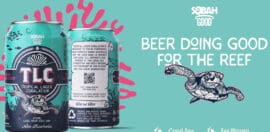Thirsty? These seaweed pouches could be the water bottles of the future

11 May 2019 at 12:00 pm
Runners in this year’s London Marathon were given a quench thirster with a twist – edible seaweed pouches carrying sports-drink – in a bid to cut down on plastic water bottles at the event.
In 2018, almost 1 million plastic water bottles were handed out to runners during the race.
By switching to the seaweed pouches, organisers of this year’s race, which took place at the end of April, cut down the number of plastic bottles by around 200,000.
The pouches, called Oohoo, were developed by a London based start-up, Skipping Rocks Lab, and can be bitten to release the liquid inside and then eaten entirely.
If the tasteless seaweed film is not eaten, it will break down within six weeks, a serious reduction from the 450 years it takes for a plastic water bottle to break down.
The decision to hand out the pouches at the 23-mile mark followed a successful trial of the product at the Vitality Big Half Marathon in March.
Co-founder of Skipping Rocks Lab, Rodrigo Garcia Gonzalez told CNN having the Oohoo used in the marathon was a milestone for the start-up.
“We are hoping we will demonstrate that it can be used at scale in the future,” Garcia Gonzalez said.
The pouches have also been used at music festivals, where they were filled with alcoholic and sports drinks.
Skipping Rocks Lab is working on eco-friendly alternatives to cling film and the plastic liners used in throwaway coffee cups.
The seaweed pouch initiative was part of a larger sustainability push by the marathon this year, which also saw 700 runners trial water bottle belts made from 90 per cent recycled materials, which can be cleaned and reused.
The bottle belts were launched in the hope of encouraging runners to carry their own water, changing how hydration is provided at mass participation running events.
It is estimated that 1 million plastic bottles are purchased per minute, and of these plastic bottles, 91 per cent will not be recycled, with most making their way to landfill.







